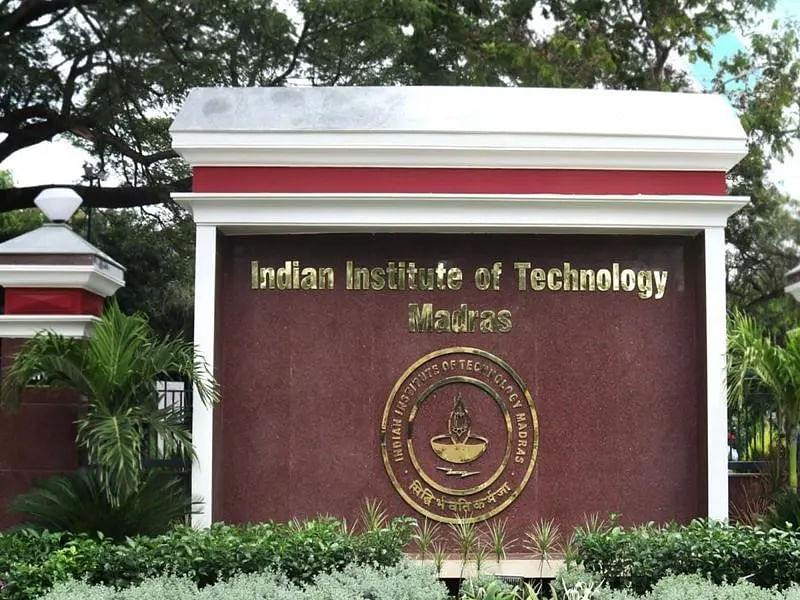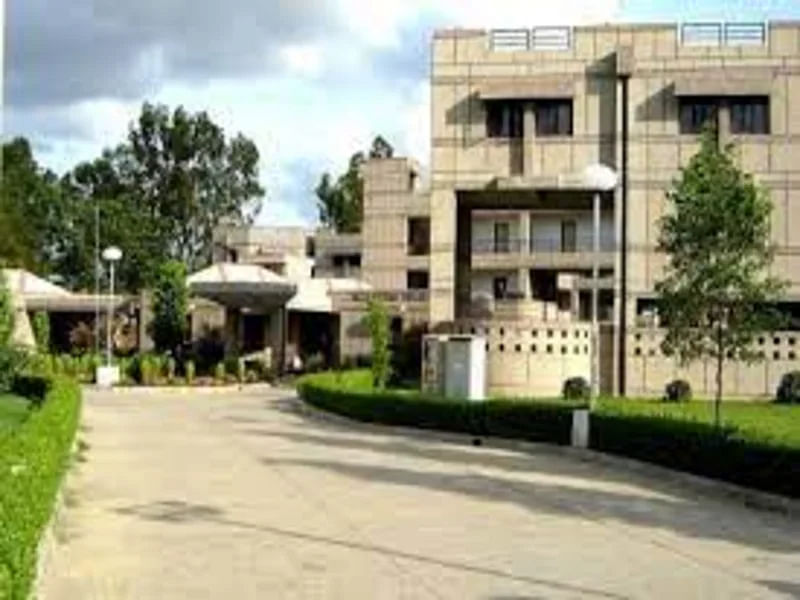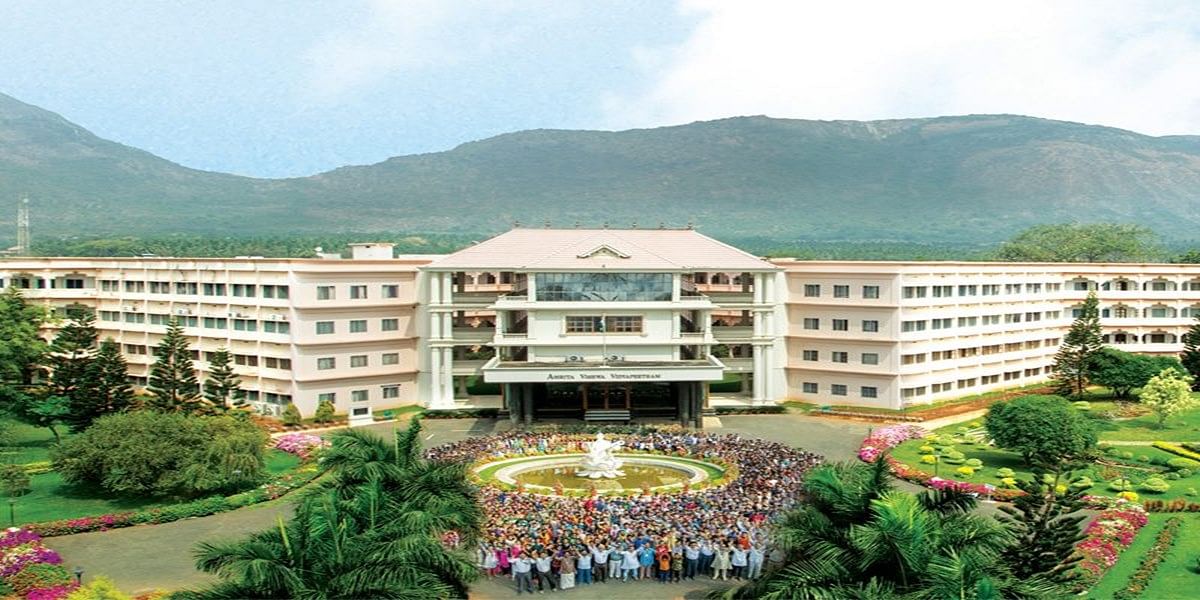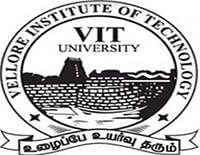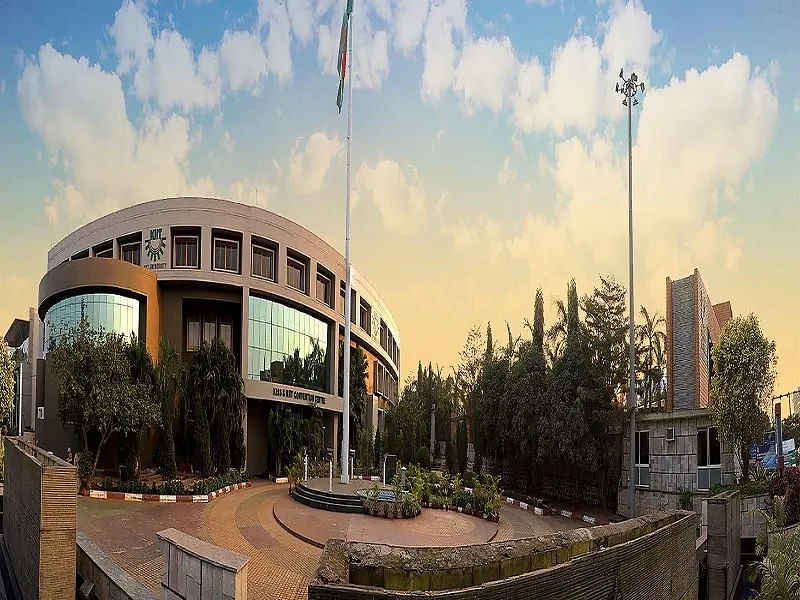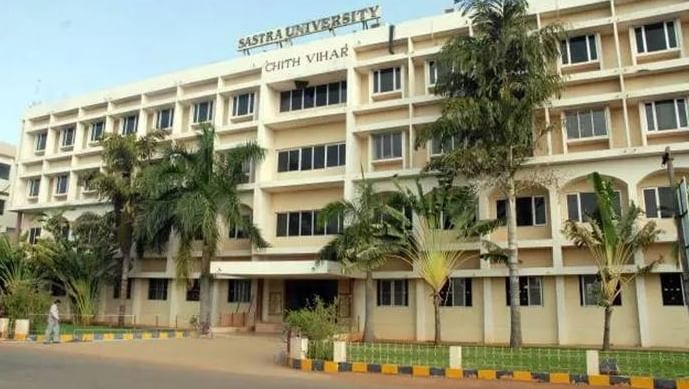B.Tech Aerospace Engineering Syllabus and Subjects

The B.Tech Aerospace Engineering syllabus is divided into eight semesters and focuses on topics such as Aerodynamics, Propulsion, Flight Mechanics, Thermodynamics, Aeroelasticity, Avionics, and more. The B.Tech Aerospace Engineering course curriculum is structured into a combination of core subjects, elective courses, practical sessions, internships, and projects.
The core B.Tech Aerospace Engineering subjects include foundational and advanced concepts such as Aerospace Engineering, Aircraft Propulsion Systems, Control Theory, Flight Dynamics & Control, Computation Methods, and more. The elective subjects deal with topics such as Boundary Layer Theory, Combustion Technology, Cryogenics, Space Mechanics, and more.
The laboratory sessions offer practical experience in areas such as wind tunnel testing, structural analysis, flight simulation, etc. In addition, internships and projects allow students to explore the real-world aerospace engineering environment.
Table of Contents
B.Tech Aerospace Engineering Syllabus Semester Wise
The B.Tech Aerospace Engineering syllabus is generally the same across most institutions in India offering the course. However, there may be slight variations in the curriculum depending on the colleges.
The B Tech Aerospace Engineering syllabus spans four years and equips students with the necessary knowledge and practical skills. The semester-wise BTech Aerospace Engineering syllabus is detailed in the sections below.
B.Tech Aerospace Engineering Syllabus 1st Year
The B.Tech Aerospace Engineering 1st year syllabus focuses on foundational topics such as Engineering Physics, Basic Aerodynamics, Engineering Workshop, Engineering Graphics, and more.
The BTech Aerospace Engineering syllabus first year is provided in the table below.
|
Semester I |
Semester II |
|
Mathematics-I |
Mathematics-II |
|
Engineering Physics-I |
Engineering Physics-II |
|
Engineering Mechanics |
Engineering Chemistry |
|
Problem Solving and Programming |
Basic Electrical & Electronics Engineering |
|
Engineering Graphics |
Engineering Workshop |
|
Communicative English |
Introduction to Aerospace Engineering |
|
Practical / Lab Work |
Practical / Lab Work |
Practical Topics For B.Tech Aerospace Engineering Syllabus 1st Year
The practical topics for the BTech Aerospace Engineering 1st year syllabus are given below.
- Engineering Physics Lab
- Engineering Chemistry Lab
- Programming Lab
- Engineering Graphics
B.Tech Aerospace Engineering Syllabus 2nd Year
The B.Tech Aerospace Engineering 3rd semester syllabus includes topics such as Aerospace Materials, Thermodynamics, Fluid Mechanics, etc while the 4th semester syllabus deals with Computational Methods, Control Theory, Propulsion, etc.
The B.Tech Aerospace Engineering 2nd year syllabus is given in the table below.
|
Semester III |
Semester IV |
|
Mathematics-III |
Mechanics of Solid |
|
Mechanics of Materials |
Computational Methods in Aerospace Engineering |
|
Aerospace Materials Engineering |
Aircraft Propulsion |
|
Thermodynamics |
Control Theory |
|
Fluid Mechanics |
Environmental Science |
|
Computer Aided Aircraft Drawing |
Compressible Fluid Flow |
|
Practical / Lab Work |
Practical / Lab Work |
Practical Topics for B.Tech Aerospace Engineering Syllabus 2nd Year
The practical topics for B.Tech Aerospace Engineering second year are outlined below.
- Fluid Mechanics Lab
- Materials Testing Lab
- Measurement and Instrumentation Lab
- Flight Systems Lab
B.Tech Aerospace Engineering Syllabus 3rd Year
The B.Tech Aerospace Engineering 3rd year syllabus covers topics such as Aerodynamics, Flight Mechanics, Avionics, etc. Below listed is the third year B Tech Aerospace Engineering syllabus.
|
Semester V |
Semester VI |
|
Aerodynamics-I |
Aerodynamics-II |
|
Aerospace Structures-I |
Aerospace Structures-II |
|
Flight Mechanics |
Avionics |
|
Finite Element Methods for Aerospace |
Combustion Technology / Advanced Aerospace Structures / Flight Dynamics |
|
Flight Vehicle Design |
Boundary Layer Theory / Aero-Elasticity / Vibration Analysis |
|
Practical / Lab Work |
Practical / Lab Work |
Practical Topics for B.Tech Aerospace Engineering Syllabus 3rd Year
The B Tech Aerospace Engineering Syllabus 3rd year practical topics are listed below.
- Aircraft Propulsion Lab
- Aerodynamics Lab
B.Tech Aerospace Engineering Syllabus 4th Year
The B.Tech Aerospace Engineering syllabus of the fourth year deals with topics such as Aircraft Designs, Flight Dynamics, Shock Capturing, and more. Listed below are the B.Tech Aerospace Engineering 4th year syllabus.
|
Semester VII |
Semester VIII |
|
Computational Fluid Dynamics for Aerospace |
Airport Planning and Management / Optimization Methods / Flapping Wing Aerodynamics |
|
Aero Design |
Turbulent Flows / Aerodynamics of Turbomachinery / Space Mechanics |
|
Flight Dynamics & Control |
Practical / Lab Work |
|
Cryogenics / Helicopter Engineering / Rockets & Missiles |
Project |
|
Hypersonic Aerodynamics / State Space Techniques / Introduction to Composite Materials |
- |
|
Practical / Lab Work |
- |
Practical Topics for B.Tech Aerospace Engineering Syllabus 4th Year
The practical topics covered in B Tech Aerospace Engineering 4th year syllabus are listed below.
- Flight Testing Lab
- Computational Fluid Dynamics for Aerospace Lab
B.Tech Aerospace Engineering Subjects
The B.Tech Aerospace Engineering subjects help students identify, formulate, and solve engineering problems in the field of aerospace. The B Tech Aerospace Engineering subjects also provide students with complete knowledge to analyze, design, and develop applications in the emerging areas within the field.
An overview of the subjects of B.Tech Aerospace Engineering is detailed in the sections below.
B.Tech Aerospace Engineering Subjects First Year
The B.Tech Aerospace Engineering subjects 1st year focus on topics such as Basic Aircraft Structures, Surface Properties, Calculus, and more. The first-year B.Tech Aerospace Engineering subjects are provided in the table below.
|
Subjects |
Topics Covered |
Subject Type |
|
Mathematics-I |
Calculus, Limit and Continuity, Graphing, Integration, Matrix Algebra, Numerical Computations |
Core |
|
Engineering Physics-I |
Mechanics, Waves and Optics, Lasers, Quantum Mechanics, Introduction to Solids |
|
|
Engineering Mechanics |
Friction, Structure Analysis, Properties of Surfaces, Kinematics, Kinetics |
|
|
Problem Solving and Programming |
Statements, Arrays, Strings, Functions, Pointers, Enumerated, Structure and Union Types |
|
|
Engineering Graphics |
Orthographic Projections, Projection of Straight Lines Plane Surfaces Regular Solids, 2D Geometries |
|
|
Communicative English |
Reading Comprehension, Vocabulary Building, Remedial Grammar, Writing Skills |
|
|
Mathematics-II |
Multivariable Calculus, Vector Differentiation & Integration, Ordinary Differential Equation, Computational Methods |
|
|
Engineering Physics-II |
Special Theory of Relativity, Wave Mechanics, Atomic Physics, Solid State Physics |
|
|
Engineering Chemistry |
Atomic Structure and Chemical Bonding, Photochemistry, Solar Energy, Corrosion Control, Water Technology |
|
|
Basic Electrical & Electronics Engineering |
Current & Voltage, Network Analysis, Electrical Machines, EMF Equation, PN Junction Diodes, Operational Amplifiers |
|
|
Engineering Workshop |
Carpentry, Fitting, Foundry, Plumbing, Machine Shop, Wood Turning, Welding |
|
|
Introduction to Aerospace Engineering |
Wind Tunnels, Engines, Structures, Aircraft, Propulsion, Satellite Systems |
|
|
Engineering Physics Lab |
Young’s Modulus Non-Uniform Bending, Spectrometer, Newton’s Ring Method, Solar Cell, Photoelectric Effect |
Laboratory/Practical |
|
Engineering Chemistry Lab |
Potentiometric Titration, Conductometric Titration, Ion-Exchange Method, Kinematic Viscosity, Separation Techniques |
|
|
Programming Lab |
Cosine Series, Fibonacci Series, User Defined Function Calls, File Handling, Use of Tuple Data Type, Python Program Flow Control |
|
|
Engineering Graphics |
Projections of Point and Lines, Projections of Plane Figures, Projection of Solids, Development of Surface |
B.Tech Aerospace Engineering Subjects Second Year
The B.Tech Aerospace Engineering subjects 2nd year cover topics such as Flight Vehicle Materials, Fluid Flows, Thermodynamic Relations, etc. The second-year B.Tech Aerospace Engineering subjects and topics covered under them are provided in the table below.
|
Subjects |
Topics Covered |
Subject Type |
|
Mathematics-III |
Laplace Transforms, Differentiation & Integration of Transforms, Partial Differential Equations, Fourier Series |
Core |
|
Mechanics of Materials |
Stresses in Axial Members, Stress in Transverse Members, Deflection in Transverse Members |
|
|
Aerospace Materials Engineering |
Flight Vehicle Materials, Light Metal Alloys, High Strength Heat Resistant Alloys, Composite Materials, Manufacturing Process |
|
|
Thermodynamics |
Laws, Engineering Applications, Properties of Pure Substances, Thermodynamic Relations, Power Cycles |
|
|
Fluid Mechanics |
Fluid Properties and Statics, Measurement of Pressure, Fluid Kinematics, Fluid Dynamics, Closed Conduit Flow |
|
|
Computer-Aided Aircraft Drawing |
Sectional Views, Fasteners, Aircraft Assembly Drawings, Airfoil & Wing Drawing, Manufacturing Drawing |
|
|
Mechanics of Solid |
Stresses and Strains, Theories of Failure, Thin Cylinders, Spherical Shells, Shear Force, Bending Moment |
|
|
Computational Methods in Aerospace Engineering |
Approximations, Roots of Equations, Algebraic Equations, Eigenvalues and Eigenvectors Problem, Laplace Equation, Integration |
|
|
Aircraft Propulsion |
Thermodynamics of Gas Turbine Engines, Axial Flow Compressors, Axial Flow Turbines, Combustion System, Subsonic 1-D Flow |
|
|
Control Theory |
Mathematical Modeling, Definition of Stability, Root Locus Design Method, State Space Design |
|
|
Environmental Science |
Natural Resources, Ecosystems, Biodiversity Conservation, Environmental Pollution, Social Issues and Environment |
|
|
Compressible Fluid Flow |
Energy Equation, Compressible Flows, Flow Through Varying-area Duct, Fanno Flow, Rayleigh Flow |
|
|
Fluid Mechanics Lab |
Calibration, Friction Factor, Centrifugal & Reciprocating Pump, Peloton Wheel, Brinnel’s Hardness Test, Charpy’s Method |
Laboratory/Practical |
|
Materials Testing Lab |
Tension Test, Hardness Test, Double Shear Test, Static Bending Test, |
|
|
Measurement and Instrumentation Lab |
Calibration Exercises, Oscilloscope, Signal Generator, Pressure Gauges, Anemometer, Proving Ring, Load Cell |
|
|
Flight Systems Lab |
Aircraft Fuel System, Aircraft Jacking, Symmetry Check Procedure, Hydraulic System, Pneumatic System, Oxygen System, Load Test |
B.Tech Aerospace Engineering Subjects Third Year
The B.Tech Aerospace Engineering subjects 3rd year deals with topics such as Elasticity Theory, Aircraft Performance, Combustion Technology, Pressure Distribution, and more. The B.Tech Aerospace Engineering third-year subjects and topics covered under them are given below.
|
Subjects |
Topics Covered |
Subject Type |
|
Aerodynamics-I |
Equations of Fluid Flow, Potential Flows, Thin Airfoil Theory, Finite Wing Theory |
Core |
|
Aerospace Structures-I |
Elasticity Theory, Mohr’s Circle, Joints Analysis, Columns Buckling, Euler’s Formula, Failure Theory |
|
|
Flight Mechanics |
Flight Principles, Aircraft Performance, High Lift Devices, Accelerating Flight, Stability & Control |
|
|
Finite Element Methods for Aerospace |
Coordinate Systems, 1D Elements, Beam Bending Element, 2D Elements, 3D Formulations, |
|
|
Flight Vehicle Design |
Airplane Weight Estimation, Fuselage, Empennage, Landing Gears, Engine Selection |
|
|
Aerodynamics-II |
Isentropic Flows, Normal Shock Theory, Expansion Theory, Nozzle Flows, Supersonic Inlets |
|
|
Aerospace Structures-II |
Types, Loads, Membrane Analogy, Euler Bernoulli Timoshenko Beam Theories, Torsional Shear Flows |
|
|
Avionics |
Air Data Systems, Embedded Systems, Inertial Sensors & Systems, Navigation Systems, Autopilot & UAV Avionics |
|
|
Combustion Technology |
Aviation Fuels, Thermodynamics of Combustion, Premixed Flames, Non Premixed Flames, Emissions & Control |
Elective |
|
Advanced Aerospace Structures |
Stress Analysis, Structural and Loading Discontinuities in Thin-Walled Beams, Fatigue, Fracture Machine |
|
|
Flight Dynamics |
Stick Fixed Static Longitudinal Stability, Control Surfaces and Aerodynamic Balancing, Stick Free Static Longitudinal Stability, Dynamic Stability |
|
|
Boundary Layer Theory |
Navier-Stokes Equation, Laminar Boundary Layer, Turbulent Boundary Layer, Compressible Boundary Layer |
|
|
Vibration Analysis |
Free Vibration of Single Degree of Freedom Systems, Harmonically Excited Vibrations, Multi Degree of Freedom Systems, Acoustics |
|
|
Aircraft Propulsion Lab |
Axial Flow Compressors, Centrifugal Compressors, Nozzles Aerodynamics, Nozzle Performance, Turbine Performance |
Laboratory/Practical |
|
Aerodynamics Lab |
Pressure Distribution, Measurement of Lift, Pitching Moment, Wing Configurations, Supersonic Flow, Velocity Profile |
B.Tech Aerospace Engineering Subjects Fourth Year
The B.Tech Aerospace Engineering subjects 4th year include topics such as Grid Generation, Aero Design Process, Stability Augmentation System, and more. The B.Tech Aerospace Engineering fourth-year subjects and topics covered under them are listed below.
|
Subjects |
Topics Covered |
Subject Type |
|
Computational Fluid Dynamics for Aerospace |
Numerical Methods, Finite Difference Methods, Shock Capturing, Stability Analysis, Grid Generation |
Core |
|
Aero Design |
Design Process, Regulatory Requirements, Weight Volume & Size Estimates, Weight Distribution, Stability Estimates |
|
|
Flight Dynamics & Control |
Static & Dynamic Stability, Small Perturbation Theory, Flying & Handling Qualities, Stability Augmentation System |
|
|
Cryogenics |
Low-Temperature Processes, Gas Liquefaction and Refrigeration Systems, Gas Separation, Purification |
Elective |
|
Helicopter Engineering |
Momentum Theory, Wake Analysis, Rotor Mechanism, Configuration & Power Estimates, Rotor Aerodynamics Design |
|
|
Rockets & Missiles |
Aerodynamics of Rockets & Missiles, Rocket System, Rocket Motion, Gravitational Field, Multi-Stage Rocket, Separation Systems |
|
|
Hypersonic Aerodynamics |
Surface Inclination Methods, Approximate Methods, Viscous Hypersonic Flow Theory, Viscous Interactions |
|
|
State Space Techniques |
Matrix Algebra & Vector Spaces, State-Space & State-Vector, Solutions of Non-Homogenous State Equations |
|
|
Introduction to Composite Materials |
Classifications, Macro & Micro Mechanical Behaviour of Lamina, Performance of Composite Materials |
|
|
Airport Planning and Management |
Airport Systems, Components, Operations & Financial Management, Public Administration & Planning |
|
|
Optimization Methods |
Optimization Using Calculus, Linear Programming, Dynamic Programming, Integer Programming |
|
|
Flapping Wing Aerodynamics |
Rigid Fixed & Flapping-Wing Aerodynamics, Flow Physics, Flexible Wing Aerodynamics |
|
|
Turbulent Flows |
Inviscid Instability, Rayleigh Equation, Inflection Criteria, Wind-Tunnel Turbulence, Eddy Viscosity, Isotropic Turbulence |
|
|
Aerodynamics of Turbomachinery |
Axial Flow Compressors, Centrifugal Compressors, Axial Flow Turbines, Radial Flow Turbines, Dimensional Analysis |
|
|
Space Mechanics |
Conics, Orbital Elements Determination from Position and Velocity at a Point, Time-Of Flight, Kepler’s Problem, Solution Algorithm |
|
|
Flight Testing Lab |
Glide Performance, Climb Rate, Range and Endurance, Turn Rate, Phugoid Mode, Roll Subsidence |
Laboratory/Practical |
|
Computational Fluid Dynamics for Aerospace Lab |
Lax-Fredric & Law Wendroff Techniques, Converging-Diverging Nozzle, Grid Generation, Axi-symmetric Elements |
BTech Aerospace Engineering Course Structure
The B.Tech in Aerospace Engineering curriculum comprises a strategic combination of theoretical and practical coursework along with skill enhancement programs focusing on the overall development of the students. The B.Tech Aerospace Engineering course structure followed by most colleges in India is outlined below.
- VIII Semesters
- Core Subjects
- Elective Subjects
- Practicals
- Internships
- Project
- Viva Voce
B.Tech Aerospace Engineering Teaching Methodologies and Techniques
The B.Tech Aerospace Engineering course employs teaching methods that aim to equip students with the technical and practical skills required in aerospace engineering, emphasizing problem-solving, innovation, and engineering design. The B.Tech Aerospace Engineering teaching methodologies and techniques are listed below.
- Lectures
- Laboratory
- Group Discussions
- Case Studies
- Problem-Based Learnings
- Engineering Workshops
- Guest Lectures
- Research Projects
- Industrial Visits
B.Tech Aerospace Engineering Projects
The B.Tech in Aerospace Engineering course includes projects as an integral part of their curriculum. Projects help students apply their theoretical knowledge to practical applications that enhance their understanding of the topics. Some of the popular project topics under B.Tech Aerospace Engineering includes:
- Integrate fiber optic sensors in a wing structure for real-time damage detection.
- Investigate and analyze heat shield materials and designs for re-entry.
- Develop and test algorithms for coordinating multiple drones in rescue missions.
- Model and develop control strategies for a tilt-rotor aircraft.
- Integrate and analyze a hybrid propulsion system’s performance for a light aircraft.
B.Tech Aerospace Engineering Books
The B.Tech Aerospace Engineering books are helpful resources for students pursuing the course as they provide detailed explanations and the latest information on aerospace engineering concepts. The B.Tech Aerospace Engineering reference books are provided in the sections below.
B.Tech Aerospace Engineering Books 1st Year
The B.Tech Aerospace Engineering books in the first year deal with basic science and aerospace engineering concepts. The B.Tech Aerospace Engineering first-year books are listed below.
|
Books |
Authors |
Topics Covered |
|
Introduction to Flight |
J. D. Anderson |
Flight Mechanics, Propulsion, Aircraft Structures |
|
Interactive Aerospace Engineering and Design |
D. Newman |
Design Process, Systems Engineering, CAD |
|
Engineering Mechanics |
N.H. Dubey |
Statics, Dynamics, Fluid Mechanics |
|
Basic Electrical and Electronics Engineering |
S. K. Bhattacharya |
Circuit Theory, Power Systems, Electrical Machines |
B.Tech Aerospace Engineering Books 2nd Year
The second-year B.Tech Aerospace Engineering books focus on topics such as Engineering Materials, Propulsion Systems, Control Theory, and more. The B.Tech Aerospace Engineering second-year books are listed below.
|
Books |
Authors |
Topics Covered |
|
Engineering Thermodynamics |
P.K. Nag |
Laws of Thermodynamics, Properties of Pure Substances, Thermodynamic Cycles |
|
Aircraft Materials and Processes |
G. F. Titterton |
Composite Materials, Manufacturing Processes, Heat Treatment |
|
Fluid Mechanics |
F.M. White |
Fluid Properties, Kinematics, Control Volume Analysis |
|
Aircraft Propulsion and Gas Turbine Engines |
A. F. El-Sayed |
Propulsion Systems, Jet Engines, Combustion Processes |
B.Tech Aerospace Engineering Books 3rd Year
The B.Tech Aerospace Engineering books of the third year include important topics such as Aerodynamics, Avionics, Flight Mechanics, and more. The third-year BTech Aerospace Engineering books are provided in the table below.
|
Books |
Authors |
Topics Covered |
|
Aerodynamics |
L. J. Clancy |
Airfoil & Wing Theory, Subsonic Flow, Boundary Layers |
|
Aircraft Structures for Engineering Students |
T. H. G. Megson |
Structural Analysis, Load Distribution, Structural Stability |
|
Flight Stability and Automatic Control |
R. C. Nelson |
Aircraft Dynamics, Control Surfaces, State-Space Representation |
|
Introduction to Avionics |
R.P.G Collinson |
Avionics System, Navigation Systems, Radar Systems |
B.Tech Aerospace Engineering Books 4th Year
The B.Tech Aerospace Engineering fourth-year books cover important topics such as Fluid Dynamics, Space Flight Mechanics, Optimization Methods, and more. The B.Tech Aerospace Engineering 4th year books are listed in the table below.
|
Books |
Authors |
Topics Covered |
|
Computational Fluid Dynamics |
T. J. Chung |
Discretization Methods, Grid Generation, Turbulence Modeling |
|
Mechanics Of Flight |
Warren F Philips |
Aircraft Performance, Flight Dynamics, Flight Testing |
|
Aircraft Instruments and Integrated Systems |
E. H. J. Pallett |
Navigation Instruments, Engine Instruments, Autopilot Systems |
|
Airport Management |
P.C.K. Ravindran |
Airport Operations, Air Traffic Control, Airport Finance |
Top B.Tech Aerospace Engineering Colleges
Top Engineering Entrance Exams
B.Tech Aerospace Engineering Fee Structure
FAQs on B.Tech Aerospace Engineering Syllabus and Subjects
Q: What are the subjects in B.Tech Aerospace Engineering 1st year?
Q: What are the elective subjects in the B.Tech Aerospace Engineering 6th semester syllabus?
Q: Can I do B.Tech Aerospace Engineering without Maths?
Q: What are the core subjects in B.Tech Aerospace Engineering 4th year syllabus?
Q: How is the B.Tech Aerospace Engineering syllabus assessed?
Q: Where can I find the B.Tech Aerospace Engineering subjects and syllabus PDF?
